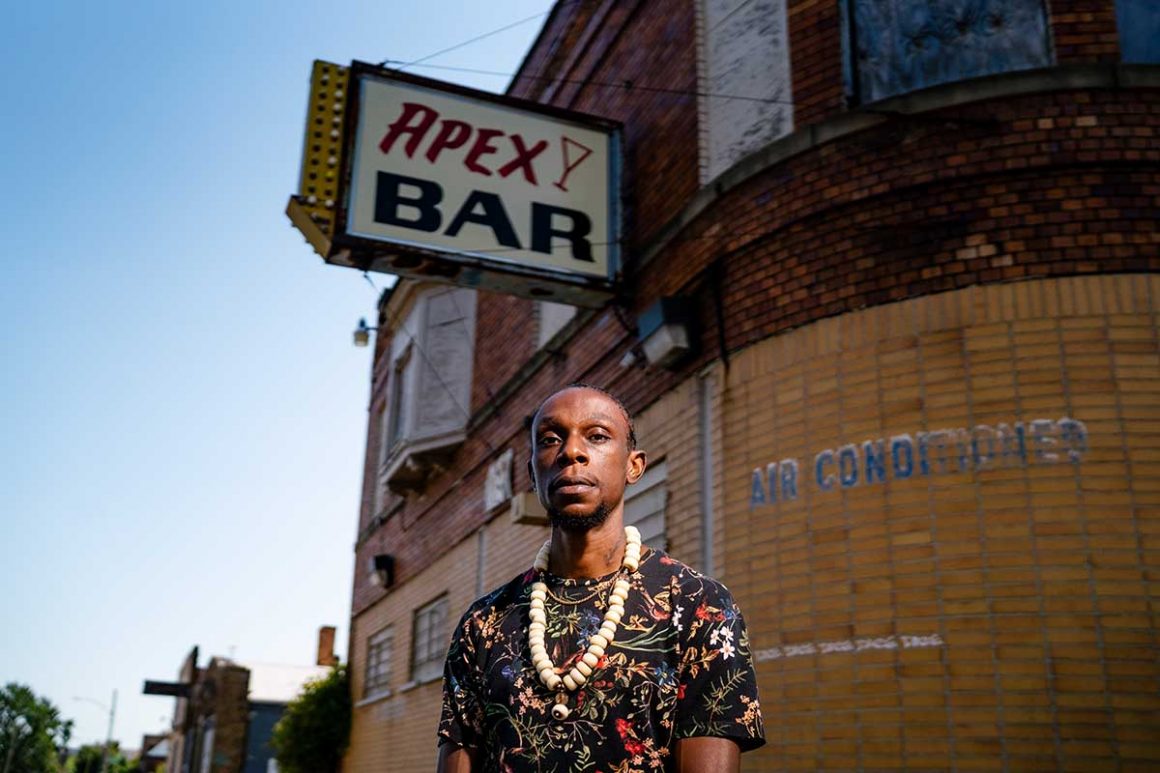Bryce Detroit in front of the Apex bar, a legendary Black music venue in North End. Detroit’s North End, which has battled gentrification, will receive funding for community-led development. (Bryce Detroit courtesy photo)
Detroiters living in the historic North End neighborhood will see new investment in their neighborhood, but this support is different from many other Detroit projects of recent years because it is predominantly being led by the people who live in the community.
The North End, which sits near the New Center area and Boston-Edison neighborhood, is one of the city’s neighborhoods facing gentrification. Activist and artist Bryce Detroit, who works with the Oakland Avenue Artists Coalition, says this community is no stranger to grant funding or investment, but this time, longtime residents will take the lead.
“It’s more needed than ever to have new pictures, new stories, new images of us in leadership and not the conventional leadership, but us in culturally-rooted leadership that’s actually socio-politically relevant to our economic and geographic circumstances,” he said.
Bryce Detroit recently launched “Hood Closed to Gentrifiers,” a campaign to address what an onslaught of investment means for a majority Black community threatened with displacement.
The Knight Foundation is funding two projects in the North End, with Vanguard Community Development Corporation and the University of Michigan’s Taubman College of Architecture and Urban Planning, respectively, to redesign the street landscape and to give residents a new library.
The Knight Foundation gave $1.5 million to Vanguard CDC for its East Grand Boulevard transformation project. Pamela Martin-Turner, CEO and president of Vanguard CDC, says her organization will use that money to install more community signs and public art on the boulevard.
“If you look at West Grand Boulevard and see how beautiful it is and all of the trees, flowers, benches, community identification signs and banners and all of that you see. We intend to do something similar and just as beautiful on East Grand Boulevard,” Martin-Turner said.
The North End is special, Martin-Turner says, for its history of inspiring Black Detroiters who came here looking for a better life at the start of the 20th century.
“People in this neighborhood set the groundwork for the first Community Benefits Ordinance adopted in the nation. People in this neighborhood know that this community can win together. We work together, through conflict and with passion. I think the grants will help move existing work, and existing organizations that have been significantly underfunded.” – Halima Cassells
“When African Americans came here, they typically lived in Black Bottom until they could stabilize themselves economically, and when they were able to do so, the North End is one of the neighborhoods that people aspired to move to,” she said.
Martin-Turner says the beautification project is scheduled to start this summer, and will take about three years to complete. Halima Cassells, another artist with the Oakland Avenue Artists Coalition and co-founder of Free Market of Detroit, says the North End is getting these grants because it is an “undeniably” special place.
“People in this neighborhood set the groundwork for the first Community Benefits Ordinance adopted in the nation. People in this neighborhood know that this community can win together. We work together, through conflict and with passion. I think the grants will help move existing work, and existing organizations that have been significantly underfunded,” Cassells said.
Along with the grant money for the East Grand Boulevard streetscape, the Knight Foundation also gave $405,000 to U-M’s Taubman School to design a community-oriented library and meeting space, which will be a part of the existing Oakland Avenue Urban Farm in the North End. Knight has also made grants to smaller organizations, like Cassells’ , that don’t see as much investment from philanthropy. Cassells says having people in charge of these projects who are from the area makes a huge difference.
Cassells, who moved back to this community after living on the East Coast for 10 years, says she thinks these grant-funded projects are great for creatives living in this community.
“I think the concentration and dedication of funding for several years is a generous commitment that allows folks to think more outside of the box on what is possible and allows for sustainability planning for all the businesses and initiatives that are present,” Cassells said.
Reverend Joan Ross is an active member in the North End. She even started WNUC (96.7 FM), the community-centered and operated radio station in the area, to give voice to her neighbors. Ross says she hopes that the Knight Foundation grants bring more community engagement in the future.
“Development that’s community-related and community-friendly and community-endorsed are things that we hope that these funds can bring into our community and other areas. Community-ownership and community-governance is vital to making a sustainable city, I hope more neighborhood investments follow suit,” Ross said.
The effort to have the community lead development planning in Detroit’s neighborhoods follows a similar effort through the Strategic Neighborhood Fund, a public-private partnership that is investing in 10 areas of the city.
Editor’s note: Knight Foundation is a financial supporter of BridgeDetroit.
Correction: An earlier version of this story described North End’s Community Benefits Ordinance as “one of the first.” It was the first.





